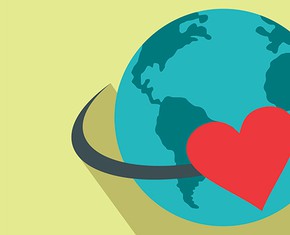The views expressed in our content reflect individual perspectives and do not represent the authoritative views of the Baha'i Faith.
When the European Union formed in 1993, and all the member countries agreed to the concept of open borders, it provoked great fear among many Europeans.
In fact, few issues have caused citizens in industrialized, developed Western democracies more political heartburn in recent years than borders and migration. Brexit, the rise of nationalist populism and a backlash against immigrants offer just a few of the multiple examples.
But when 28 European nations signed the Schengen Agreement a quarter-century ago, Europe did open its borders. That meant any European, from any of those very diverse countries and cultures, could live and work anywhere; travel freely, on the same passports; and have total freedom of movement—and a vastly increased freedom to work and produce.
Experts agree that spectacular economic and cultural results have emerged as a result. In fact, the experience of the European Union points us all toward the Baha’i ideal—a unified world in which everyone can freely move about the Earth without fear of bullets, barricades, or barbed wire at our man-made borders:
This earth is one home and native land. God has created mankind with equal endowment and right to live upon the earth. As a city is the home of all its inhabitants although each may have his individual place of residence therein, so the earth’s surface is one wide native land or home for all races of humankind. Racial prejudice or separation into nations such as French, German, American and so on is unnatural and proceeds from human motive and ignorance. All are the children and servants of God. Why should we be separated by artificial and imaginary boundaries? – Abdu’l-Baha, The Promulgation of Universal Peace, pp. 287-288.
This central Baha’i principle brings up the moral question of birthplace citizenship for every country, succinctly summarized by a compelling recent article in The Economist:
Where someone is born is entirely a matter of chance, so there is no moral justification for compelling people to stay in a poor country. By the same token, those lucky enough to have been born in rich countries have no right to exclude others from their good fortune. – “Open Borders: The Case for Immigration,” The Economist, April 16, 2018.
So what would happen if we opened the world’s borders, just as Europe did during the past century? Would a flood of “economic migrants” rapidly leave their relatively poor countries and move to the wealthier ones? Would that mass migration, as some fear, destabilize and overwhelm the cultures, the politics and the welfare systems of wealthier countries?
No, not necessarily. Research and experience both show that most people, even if it is in their economic interest to do so, rarely pull up stakes in their home country to move elsewhere. But if they did, in a world with open borders, an existing, effective global agency called the International Organization for Migration (IOM) would become increasingly important.
The IOM helps control humane and orderly migration across the world’s borders for the benefit of everyone. First chartered by the United Nations in 1951, and taking on its current oversight role in 1989, the IOM assists countries all across the world to manage in-migration. It researches and studies the global movement of migrants, recommends policies that control that movement, and helps nations balance their capacity for the humane treatment of refugees with their social and economic impact.
Today the IOM leads all other international agencies in managing human movement across the planet. The IOM also works with governments and civil society to advance the understanding of migration issues, encourage social and economic development through migration, and uphold the human dignity and well-being of immigrants and refugees.
Now, when a refugee crisis or a mass migration occurs—typically caused by war, famine, drought or natural disaster—the IOM helps relocate refugees to countries and families who agree to accept them; helps with financial aid for the refugees and their hosts; conducts job and cultural adaptation training; and generally acts as a benevolent occupational, relocation and guidance counselor for everyone involved. Rather than heartlessly turning away those in danger or in need, the IOM makes every effort to welcome and help them.
The Baha’i teachings offer this advice for anyone meeting a foreigner or a stranger:
When you meet a stranger, says Abdu’l-Baha, say, “Yonder is coming to me a letter sent me by God.” The outside of the envelope may be dirty, and torn and broken, but if we could open the envelope of the life that comes before us and look within the envelope and learn to read the writing, we would find in every human soul which crosses our threshold or which is yonder over the man-made national border, a message from God, and if we could understand the message it would be God’s benediction to us. – Abdu’l-Baha, Star of the West, Volume 6, p. 46.
Despite the anti-immigrant sentiment that has received so much publicity lately, many countries around the globe both need and welcome new migrants. In the developed world, the birth rate has fallen dramatically over the past several decades, which means many developed, so-called “first world” countries must grow their labor forces at a faster rate than their populations have grown. That means migration into those countries has a beneficial effect, both for the migrants and the countries.
The IOM’s experience during the past three decades has proven that, with sufficient assistance from the world’s governments, the international community can globally manage migration across the surface of the Earth—and that international management represents a much more efficient and humane way of dealing with such issues than each country ineffectively trying to police, patrol and enforce its own national borders.
Building barricades has never done a good job of keeping people out in the past. Instead, we should, as a united world, intelligently analyze, manage and oversee migration in a rational and reasonable way, carefully observing the human rights of both the native populations of all countries and the migrants and refugees fleeing oppression, violence and poverty in their own countries.
















Comments
Sign in or create an account
Continue with Googleor